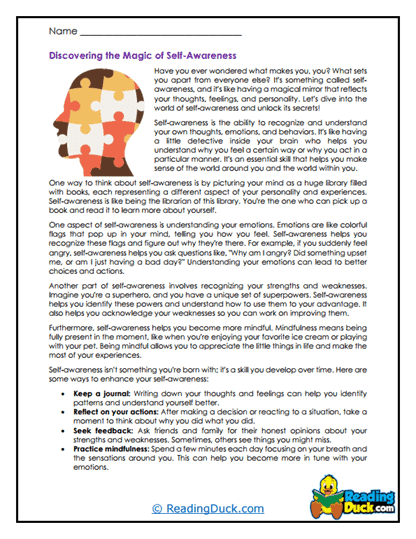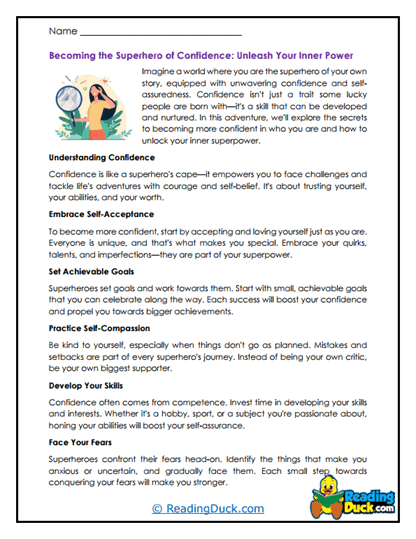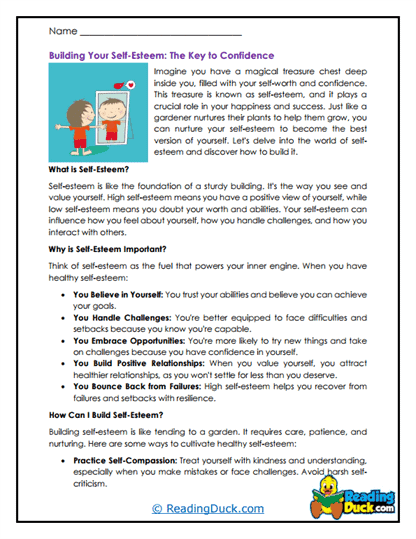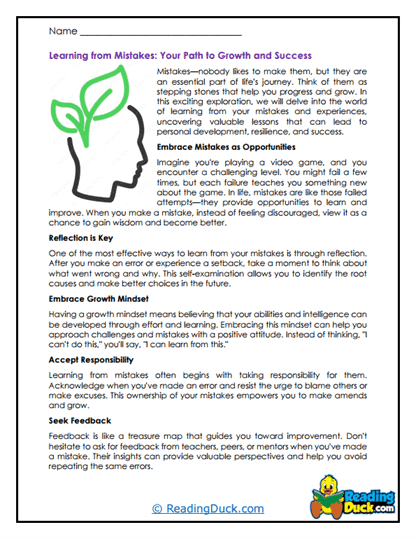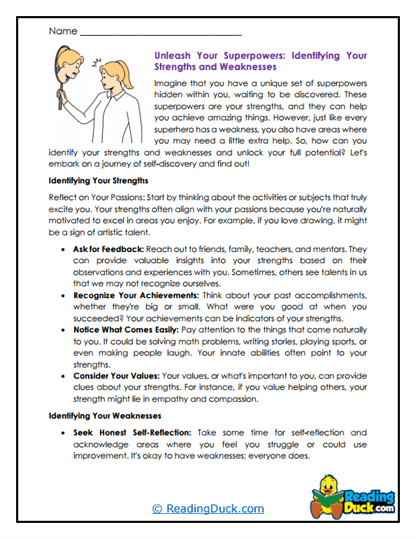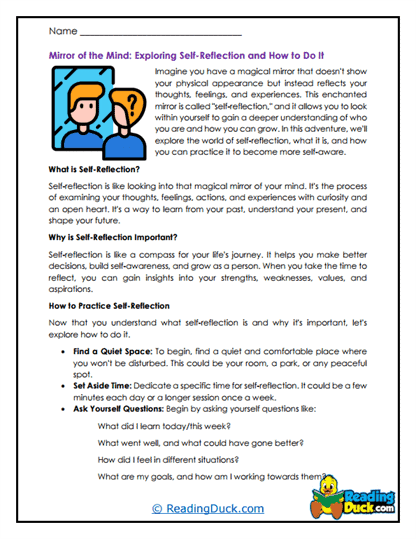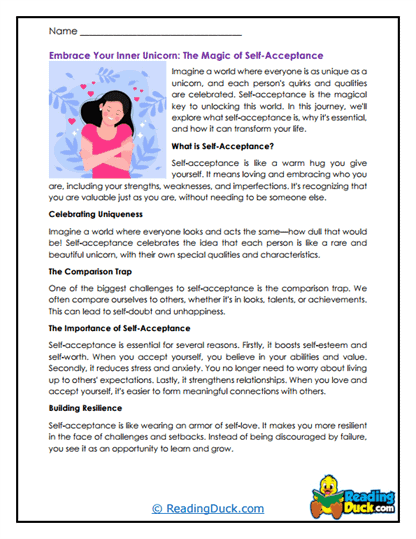Self Awareness Worksheets
About Our Self Awareness Worksheets
Our Self Awareness worksheets are designed to guide students on a journey of introspection, helping them develop a deeper understanding of their emotions, strengths, weaknesses, and overall identity. Through these worksheets, students will gain valuable insights into who they are, fostering personal growth and emotional intelligence that will benefit them throughout their lives.
Each topic in this collection contains several worksheet sets thoughtfully designed to engage students and encourage meaningful reflection:
- Multiple Choice Questions: These questions assess students' comprehension of the reading passages, ensuring they grasp the key concepts related to self-awareness and its importance.
- Short Answer Questions: This format allows students to express their thoughts and insights in their own words, promoting deeper reflection on the material.
- Open-Ended Questions: These questions invite students to explore their personal experiences and feelings related to self-awareness, encouraging critical thinking and self-expression.
These activities not only assess students' comprehension but also deepen their connection to the material. An answer key is provided for each worksheet, making it easy for educators to review and assess students' progress. All worksheets are available as PDF files, which can be easily viewed electronically, downloaded, and printed out.
Exploring Self Awareness: Understanding the Importance of Knowing Oneself
Self-awareness is the foundation of emotional intelligence, personal growth, and effective communication. It is the ability to recognize and understand your own emotions, thoughts, and values, and how they influence your behavior. When introducing this topic to students, it's important to emphasize that self-awareness is not only about understanding oneself but also about using that understanding to make informed decisions, build strong relationships, and navigate life's challenges with confidence.
Key Aspects of Self Awareness:
- Embracing Your Uniqueness: Every individual is unique, with their own set of strengths, weaknesses, and characteristics. This topic encourages students to recognize and celebrate their individuality, understanding that their uniqueness is what makes them special. Embracing one's uniqueness fosters self-confidence and a positive self-image.
- Identifying Your Strengths and Weaknesses: Self-awareness involves recognizing both your strengths and areas for improvement. This topic guides students through the process of identifying their personal strengths and weaknesses, helping them to develop a balanced view of themselves. Understanding these aspects allows students to leverage their strengths and work on their weaknesses.
- Self-Acceptance: Accepting oneself, flaws and all, is a crucial aspect of self-awareness. This topic teaches students the importance of self-acceptance and how it contributes to overall well-being. By accepting themselves as they are, students can develop a healthier relationship with themselves and others.
- Mixed Emotions: Emotions are complex and often mixed. This topic helps students understand that it is normal to experience conflicting emotions and that acknowledging these feelings is an essential part of self-awareness. Learning to navigate mixed emotions leads to better emotional regulation.
- Identifying Your Emotions: Recognizing and naming emotions is a fundamental skill in developing self-awareness. This topic provides students with tools to identify their emotions accurately, which is the first step in managing them effectively. Being able to identify emotions helps students respond to situations in a more controlled and thoughtful manner.
- Understanding Confidence: Confidence comes from a strong sense of self-awareness. This topic explores what confidence means and how students can build it by understanding their abilities and limitations. Building confidence enables students to approach challenges with a positive mindset.
- Self-Reflection: Reflecting on past experiences is a powerful tool for personal growth. This topic encourages students to engage in regular self-reflection, helping them learn from their experiences and make better decisions in the future. Self-reflection is key to continuous self-improvement.
- Honest Communication: Self-awareness plays a critical role in how we communicate with others. This topic teaches students the importance of honest and open communication, which starts with being honest with oneself. Honest communication builds trust and strengthens relationships.
- Learning From Mistakes: Everyone makes mistakes, but self-aware individuals see mistakes as opportunities for growth. This topic helps students understand the value of learning from their mistakes and how this process contributes to personal development. Learning from mistakes fosters resilience and adaptability.
- Building Your Self-Esteem: A healthy self-esteem is rooted in self-awareness. This topic guides students through the process of building their self-esteem by understanding their worth and capabilities. Strong self-esteem enables students to face challenges with confidence and optimism.
- Self-Discovery: Self-awareness is a lifelong journey of self-discovery. This topic encourages students to explore their interests, values, and aspirations, helping them to create a sense of purpose and direction in life. Self-discovery leads to a more fulfilling and meaningful life.
These topics provide students with a comprehensive understanding of self-awareness, helping them to develop the skills necessary to navigate life's challenges with confidence and resilience. By exploring these aspects, students can cultivate a deeper sense of self, leading to greater emotional intelligence and personal growth.
Why Students Need to Learn About Self Awareness
Learning about self-awareness is crucial for students of all ages because it lays the foundation for emotional intelligence, which is essential for success in both academic and personal life. When students are self-aware, they are better equipped to manage their emotions, make informed decisions, and build positive relationships. This not only enhances their academic performance but also contributes to their overall well-being. Self-awareness allows students to understand their strengths and weaknesses, helping them to set realistic goals and work towards achieving them with confidence.
Moreover, self-awareness plays a significant role in personal development by fostering a growth mindset and resilience. When students are aware of their thoughts, feelings, and behaviors, they are more likely to take responsibility for their actions and learn from their experiences. This leads to greater self-discipline, motivation, and adaptability, which are critical skills for navigating the complexities of life. In essence, learning about self-awareness helps students develop into well-rounded individuals who can face challenges with a positive and proactive attitude.
Integrating These Worksheets in a Curriculum
To effectively incorporate our Self Awareness worksheets into your curriculum, here are some tips for teachers and parents:
- Daily Reflection: Encourage students to spend a few minutes each day reflecting on their thoughts, feelings, and experiences. This helps them build the habit of self-awareness and fosters continuous personal growth.
- Class Discussions: Use the worksheets as a starting point for class discussions on self-awareness. Encourage students to share their thoughts and experiences in a supportive environment, promoting open communication and mutual understanding.
- Role-Playing Activities: Incorporate role-playing activities where students can practice self-awareness skills, such as identifying emotions, communicating honestly, and making decisions based on self-reflection.
- Journaling: Encourage students to keep a self-awareness journal where they can record their reflections, emotions, and insights. Journaling helps students process their thoughts and track their personal growth over time.
- Group Projects: Assign group projects that require students to work together and reflect on their strengths and weaknesses as a team. This fosters collaboration and helps students understand the importance of self-awareness in group dynamics.
- Mindfulness Practices: Integrate mindfulness exercises that promote self-awareness, such as deep breathing, meditation, and body scans. These practices help students stay present and connected to their thoughts and emotions.
- Parental Involvement: Encourage parents to engage in self-awareness activities with their children at home. This reinforces the lessons learned at school and creates a supportive environment for personal growth.
- Goal Setting: Use the worksheets to guide students in setting personal goals based on their strengths and areas for improvement. Goal setting helps students apply self-awareness to their academic and personal lives.
- Feedback Sessions: Create opportunities for students to receive constructive feedback from peers and teachers. Feedback helps students gain insight into their behavior and develop a deeper understanding of themselves.
- Self-Evaluation: Encourage students to regularly evaluate their progress in developing self-awareness. Self-evaluation promotes accountability and motivates students to continue their personal growth journey.
By integrating these strategies into your curriculum, you can help students develop a deeper understanding of self-awareness, fostering their emotional intelligence and personal development. The Self Awareness worksheets are a valuable resource that can be used in various educational settings, making the study of self-awareness accessible and engaging for all students. Through consistent practice and reflection, students will not only learn about the importance of self-awareness but also develop the skills necessary to lead confident, fulfilled lives.
